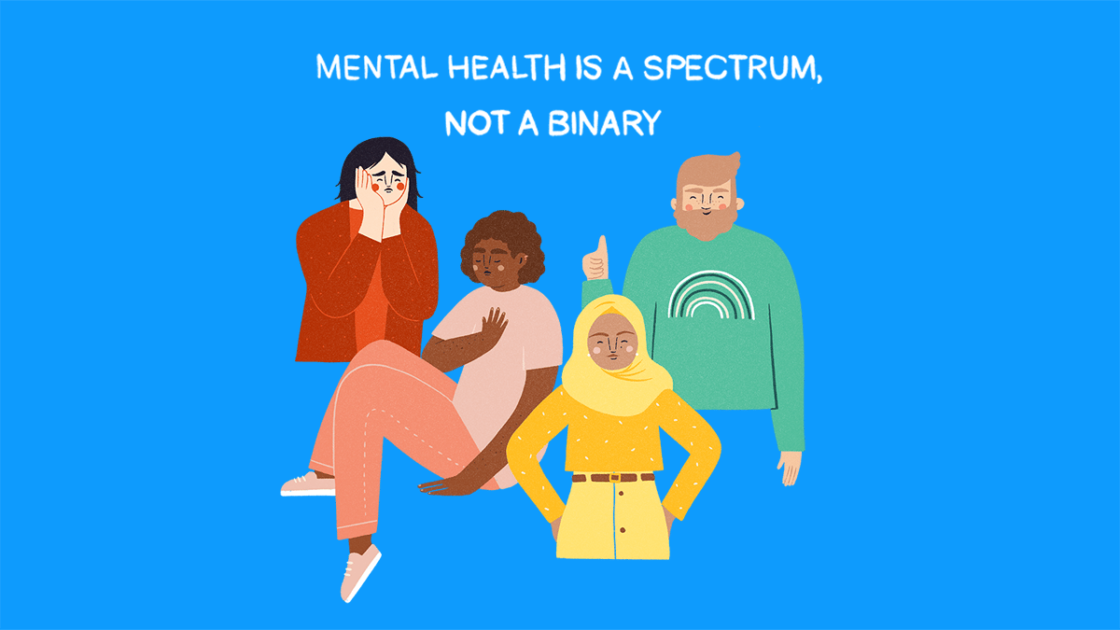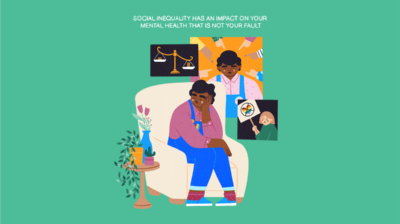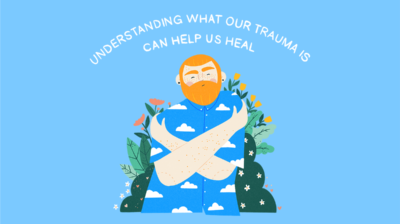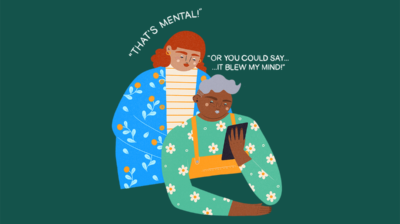What is a mental health spectrum?
Building your understanding of what mental health is can help you take control of your mental wellbeing.

Mental health and mental ill-health each lie on a mental health spectrum. Mental health is a term we hear every day but it is often misunderstood.
People frequently use the terms ‘mental health’ and ‘mental illness’ as if they mean the same thing. However, this is not actually the case. While mental health is connected to mental illness, mental health is a much broader topic which covers:
- your thoughts, feelings, and emotions
- your ability to solve problems and achieve goals
- your ability to connect to other people
- your ability to understand the world around you
Taking time to learn more about mental health and the mental health spectrum, as well as the different factors affecting it, can help you to live a happier and healthier life. It can also help you to recognise when you might need some extra support to maintain and even improve your overall wellbeing.
Thinking of mental health as the ‘mental health spectrum’
One of the biggest myths about mental health is that everyone can be divided into two separate categories: people who are ‘mentally healthy’ and people who are ‘mentally ill.’ Not only is this belief untrue but it can also be dangerous, since it can increase levels of stigma towards people with mental health conditions. A more positive and accurate way to think of mental health is as a spectrum of experiences. This spectrum ranges from excellent mental health at one end, and severe debilitating symptoms at the other end. In between these two extremes are experiences ranging from distressing symptoms that affect a person’s daily functioning, like suicidal thoughts or panic attacks, to more positive experiences that can support and maintain a person’s functioning, like feeling calm and happy.
Thinking of mental health in this way can be helpful for a number of reasons. The spectrum focuses on the positive side of mental health, as well as the negative side and everything in between. The spectrum also reflects the complexity of mental health, showing that not experiencing a mental health condition doesn’t automatically mean a person is thriving mentally. Finally, it shows that mental health is something that affects all of us, whether or not we’re currently experiencing mental health difficulties.
Can you move along the mental health spectrum?
No matter where you fall on the mental health spectrum, your place is not set in stone. Depending on your circumstances, you are likely to move up or down the spectrum throughout your life. You may have periods of poor mental health which can be brief or more long-lasting. Mental health difficulties rarely have one cause. But stressful life experiences, like trauma, losing a loved one, or being bullied, can cause you to move towards the more negative or distressing side of the spectrum. On the other hand, positive experiences, like receiving social support, getting a new job, or building your self-esteem, can help you to move towards the end of the spectrum where more positive experiences lie.
Sometimes, you may need to get some external help from a mental health professional. This can help you return to a more positive point on the spectrum. Getting help and support for mental health difficulties at the right time can prevent you from developing a mental health condition further down the line.
What is mental illness and how does it differ from mental health?
Mental illness is the general name given to a collection of conditions which can negatively impact your mental health. The term ‘mental illness’ is generally refers to conditions that have been diagnosed by a mental health professional, such as a psychiatrist or psychologist. There are a wide range of different mental health conditions, each with different sets of symptoms.
In general, the symptoms of a mental health condition can affect how you think, feel, and behave. The symptoms of mental health conditions can be distressing. These symptoms can make it more difficult to enjoy your life and work towards your goals. Common mental health conditions include depression, anxiety disorders, obsessive compulsive disorder, eating disorders, and psychotic disorders like schizophrenia. While mental health includes a wide range of both positive and negative experiences, understanding mental illness is an important part of understanding mental health in general.
Can you experience symptoms of mental illness without having a mental health condition?
Mental illness is frequently used to describe mental health conditions. However, you can also experience milder forms of mental health symptoms without having a diagnosable mental health condition. These symptoms can often emerge during challenging periods in your life. While such symptoms are usually not as severe as a long-lasting mental health condition, they can still be distressing and disruptive to the person experiencing them. Also, while they tend to pass with time, they can sometimes lead to the development of a mental health condition in the future if you do not get the support you need. It is important not to minimise the impact that these milder mental health challenges can have on your life.
If you believe you may have a mental health condition, talking to your GP is a good first step. They can put you in contact with a fully qualified mental health professional who can help you explore what you have been experiencing. They can also help you develop a personalised plan for supporting your mental health.
What does positive mental health look like?
Defining positive mental health, sometimes called ‘mental wellbeing,’ can be difficult. This is because mental wellbeing tends to look slightly different for each person. Positive mental health is more than just the absence of mental illness. This becomes clearer when you realise that mental health and mental illness experiences exist on the same spectrum, but at opposite ends. You can think of positive mental health as a variety of mental states that allow you to enjoy activities you take part in, work productively, cope with normal stresses in life, and realise your own potential. Often, positive mental health gets less attention in our society than it should.
It’s a popular myth that having positive mental health is about being happy all the time. You can still have positive mental health while living with a mental health condition or other mental health challenges. Everyone encounters stressful situations and difficult emotions from time to time. Having positive mental health will help you continue to function in the face of stress and cope with difficult feelings in healthy and productive ways. This ability to bounce back from stressful experiences is called resilience.
Can you have positive mental health if you live with a mental health condition?
Having symptoms of a mental health condition can have a significant impact on your state of mind. They can make it more difficult to function and achieve your goals. Because of this, these symptoms are often associated with the more negative side of the mental health spectrum. However, plenty of people living with mental health conditions achieve positive mental health by accessing support and treatment that allow them to effectively manage their symptoms. Positive mental health doesn’t mean that you never have mental health difficulties. Many people achieve good mental wellbeing and live the life they want to live while still living with mental health conditions.
Caring for your mental health
No matter where you currently find yourself on the mental health spectrum, you can always take steps to improve or maintain your mental wellbeing. Taking good care of your mental health is an ongoing process. It can help you stay at the positive end of the mental health spectrum, where the development of severe mental health difficulties is far less likely. There is a wide range of support and information available that can support you on your mental health journey. If you wish to find support for ongoing mental health difficulties, visit our factsheet on how to start your mental health recovery journey.
Even if you are happy with your mental wellbeing, it is important to set some time aside for maintaining it. Read about some easy steps you can take to support your mental wellbeing on an ongoing basis.
If you are experiencing mental health issues and feel like you need some extra support, speaking to your GP can be helpful. Find out more about speaking to your doctor about a mental health concern.
Feeling overwhelmed and want to talk to someone?
- Get anonymous support 24/7 with our text message support service
- Connect with a trained volunteer who will listen to you, and help you to move forward feeling better
- Whatsapp us now or free-text SPUNOUT to 50808 to begin.
- Find out more about our text message support service
If you are a customer of the 48 or An Post network or cannot get through using the ‘50808’ short code please text HELLO to 086 1800 280 (standard message rates may apply). Some smaller networks do not support short codes like ‘50808’.






